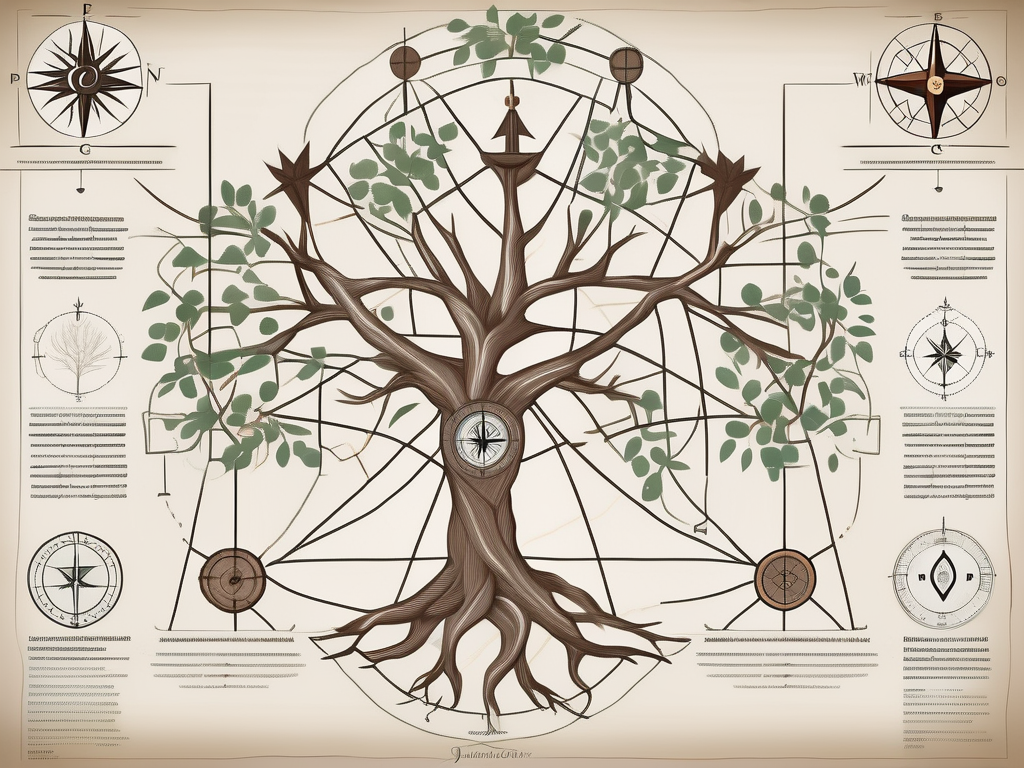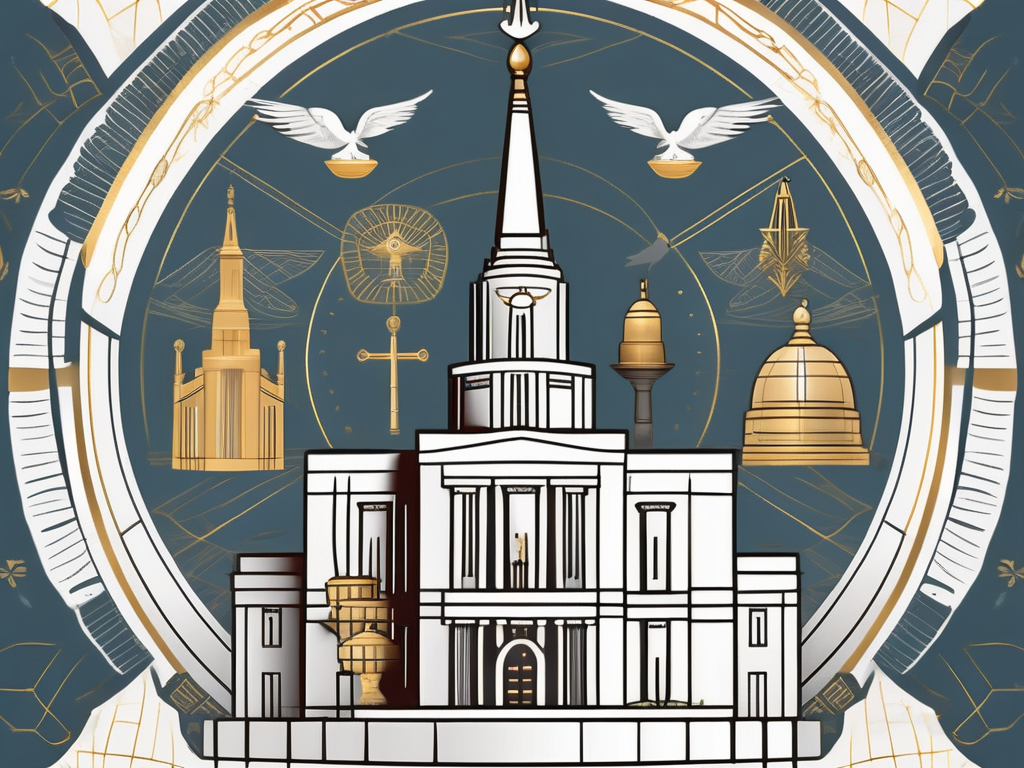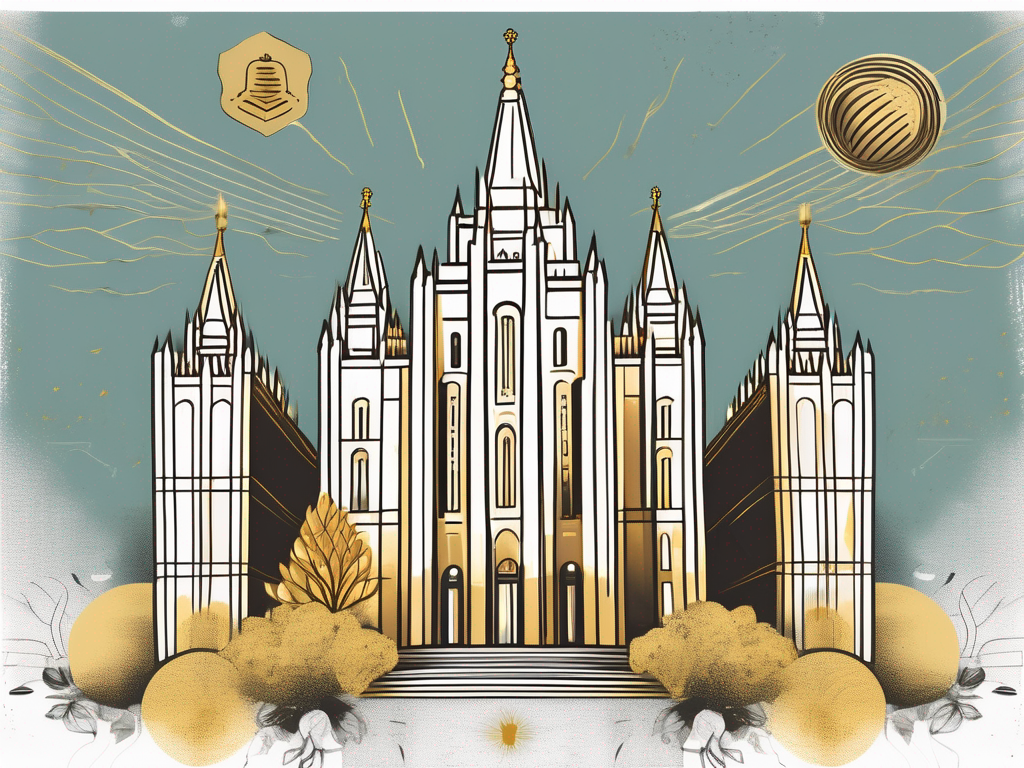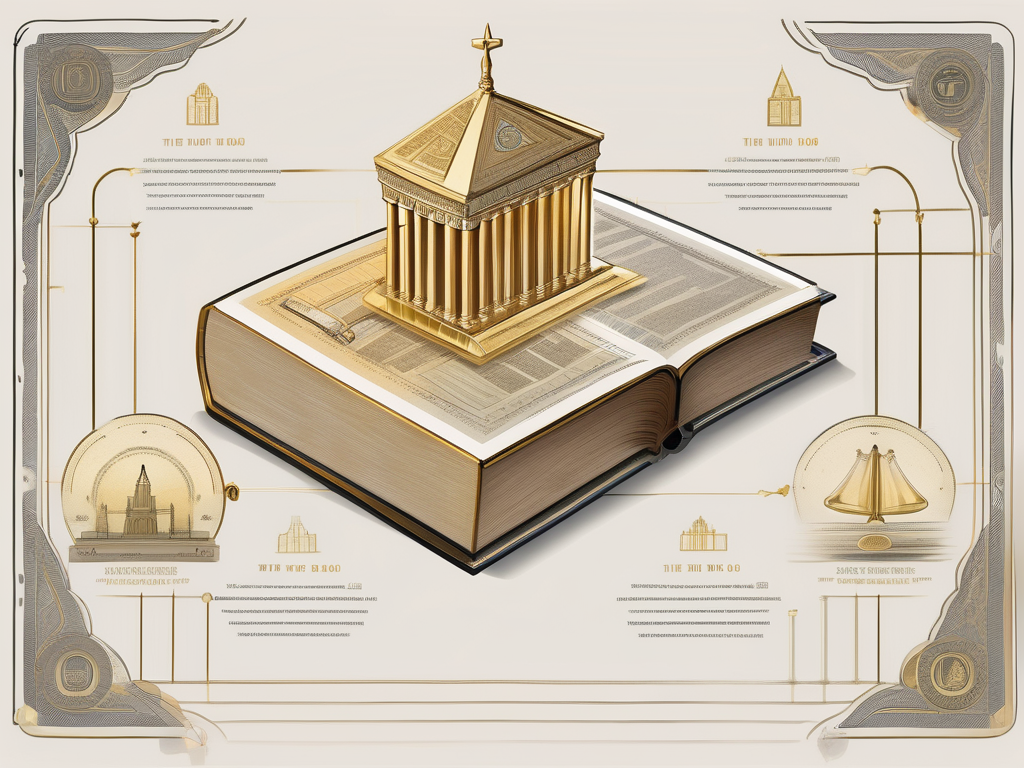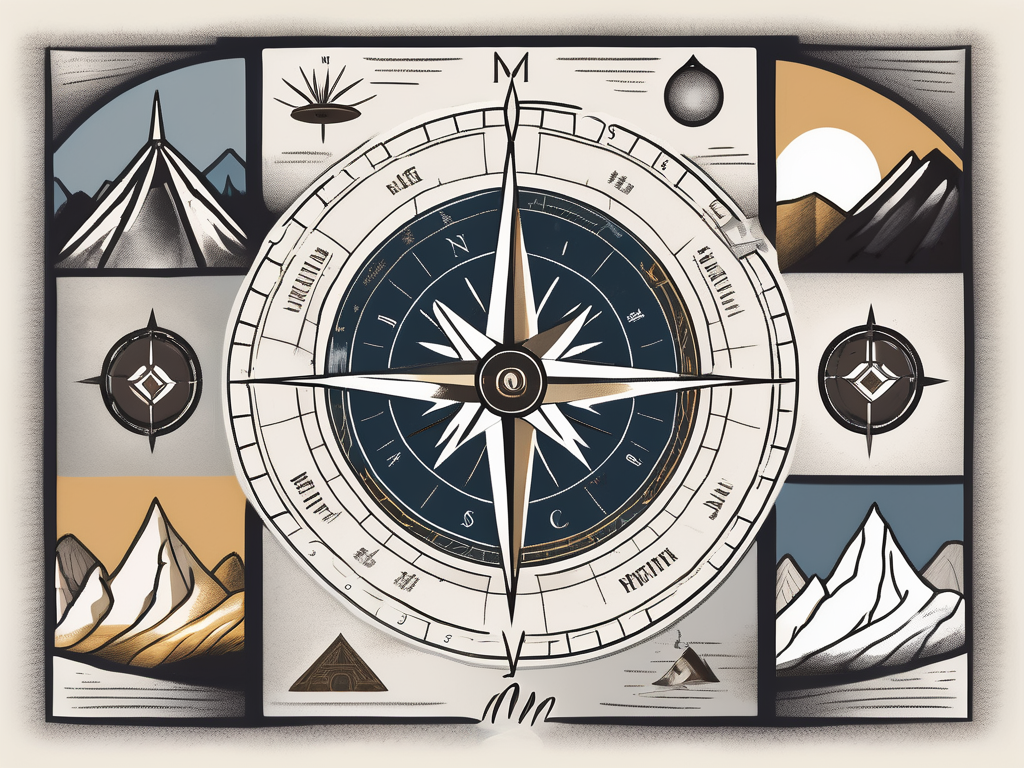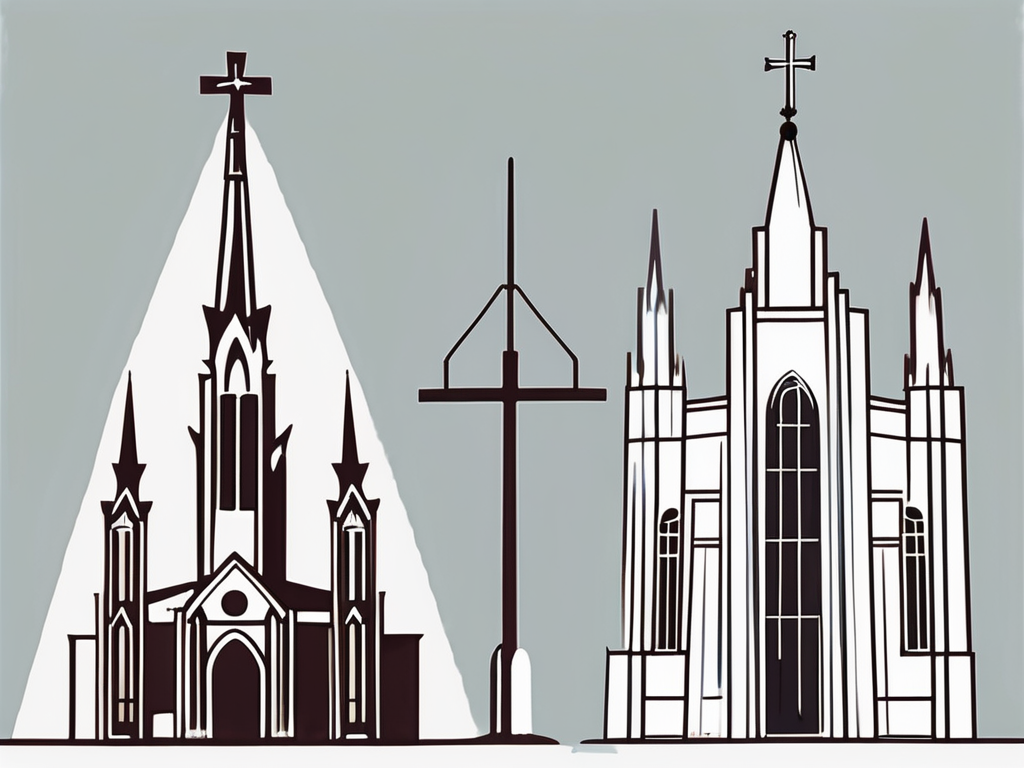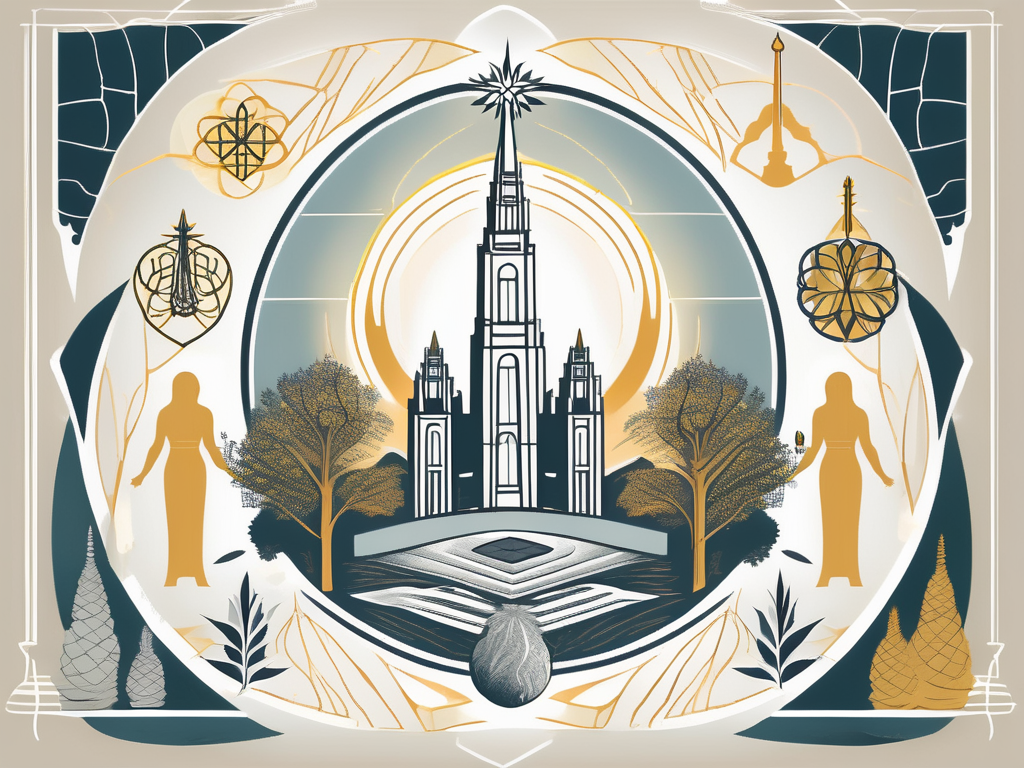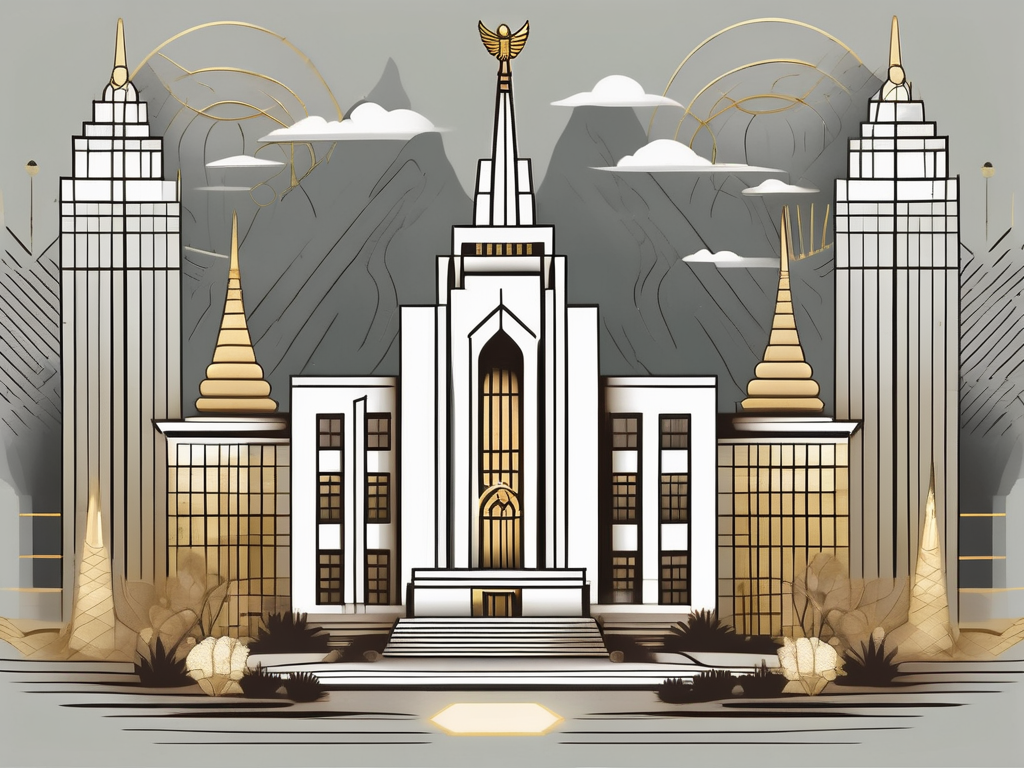Genealogy plays a significant role in the Mormon Church. It is not just a simple hobby or a way to pass the time; it is deeply ingrained in the religious and cultural traditions of the Latter-day Saints. Understanding the concept of genealogy in Mormonism is crucial to comprehending its importance and relevance within the community.
Understanding the Concept of Genealogy in Mormonism
In the Mormon Church, genealogy is seen as a way to connect with our ancestors and strengthen family bonds across generations. It goes beyond simply tracing our lineage; it is about honoring those who came before us and preserving their memories and legacies.
Genealogy is rooted in the belief that families can be sealed together for eternity through sacred ordinances performed in Mormon temples. This means that Mormons strive to gather as much information as possible about their ancestors to ensure their eternal salvation.
Theological Foundations of Mormon Genealogy
Mormon genealogy is based on the belief that families can be sealed together for eternity and that these sealings are a crucial part of Heavenly Father’s plan for His children. This belief stems from the teachings of Joseph Smith, the founding prophet of the Mormon Church, who introduced the concept of temple ordinances and the importance of family connections.
Mormons believe that by performing these ordinances on behalf of their deceased ancestors, they can offer them the opportunity to accept the blessings of the gospel in the afterlife. The family unit is seen as eternal, and the knowledge and understanding of our ancestors play a vital role in strengthening our faith.
When Mormons engage in genealogical research, they often find themselves captivated by the stories and experiences of their ancestors. They uncover tales of resilience, sacrifice, and triumph, which serve as a source of inspiration and guidance in their own lives. These stories become a part of their personal narrative, connecting them to a larger tapestry of human history.
Furthermore, the process of researching and documenting one’s genealogy can be a transformative experience. It requires patience, diligence, and attention to detail. As Mormons delve into the records, they may uncover long-lost relatives, discover unexpected connections, and piece together fragments of their family’s past. This journey of discovery not only deepens their understanding of their own heritage but also fosters a sense of belonging and connection to a larger community of believers.
The Role of Genealogy in Mormon Rituals
Genealogy plays a central role in various Mormon rituals and ceremonies. One such ceremony is known as the sealing ordinance, where a husband and wife, along with their children, are “sealed” together as a family unit for time and eternity. This sealing ordinance is performed in Mormon temples and is considered essential for eternal salvation.
These sealing ordinances, along with other rituals, require accurate genealogical information to ascertain familial relationships and ensure that the proper ordinances are performed for each individual. This emphasis on accurate genealogical record-keeping has led Mormons to become one of the largest contributors to global genealogical databases.
It is not uncommon for Mormons to spend countless hours meticulously researching their family history, scouring through birth certificates, marriage records, and census data. They may travel to ancestral homelands, visit cemeteries, and connect with distant relatives in their quest to gather as much information as possible. This dedication to genealogical research is driven by a desire to honor their ancestors and fulfill their religious obligations.
Moreover, the Mormon Church has established a vast network of genealogical resources and services to assist its members in their quest for ancestral knowledge. Family history centers, staffed by volunteers, provide access to digitized records, expert guidance, and educational materials. Online platforms, such as FamilySearch, enable Mormons to collaborate with others, share their findings, and contribute to the collective understanding of human history.
Through the practice of genealogy, Mormons not only strengthen their connection to their ancestors but also forge bonds with living family members. They engage in conversations, share stories, and pass down the knowledge they have acquired to future generations. In doing so, they create a legacy of love, faith, and resilience that will endure for generations to come.
The Historical Context of Genealogy in the Mormon Church
To understand the importance of genealogy in the Mormon Church, it is necessary to explore its historical context and how it has evolved over time.
The Mormon Church, officially known as The Church of Jesus Christ of Latter-day Saints, has a deep-rooted connection to genealogy. This connection can be traced back to the early leaders of the church, who recognized the significance of genealogical records in fulfilling the church’s mission.
Early Mormon Leaders and Genealogy
Joseph Smith, the founder of the Mormon Church, understood the importance of genealogy in connecting individuals to their ancestors and strengthening family ties. He believed that by researching and documenting one’s family history, individuals could gain a deeper understanding of their own identity and purpose.
Brigham Young, the second president of the Mormon Church, further emphasized the importance of genealogy. He encouraged church members to gather and preserve genealogical records, recognizing that these records held the key to understanding one’s lineage and eternal connections.
Under the guidance of these early leaders, the Mormon Church began to establish the foundation for genealogical research within the community. Efforts were made to collect and preserve family records, ensuring that future generations would have access to their ancestors’ stories and experiences.
Evolution of Genealogical Practices Over Time
Over the years, genealogical practices within the Mormon Church have evolved significantly. Technological advancements have played a crucial role in transforming the way Mormons conduct genealogical research.
One of the most significant advancements is the digitization of records. The introduction of FamilySearch.org, an online database, has revolutionized the accessibility of genealogical records. This platform allows members of the Mormon Church and individuals worldwide to access a vast collection of records, making it easier than ever to trace their family history.
In addition to the online database, the Mormon Church has also invested in the construction of genealogical research centers called Family History Centers. These centers serve as physical spaces where individuals can receive resources, guidance, and support in their genealogical pursuits. They provide access to additional records, expert assistance, and educational opportunities, further enhancing the genealogical experience for church members and the wider community.
Through the combination of technological advancements and the establishment of physical research centers, the Mormon Church has created a comprehensive and accessible genealogical infrastructure. This infrastructure not only supports the church’s mission of connecting families for eternity but also serves as a valuable resource for individuals seeking to explore their own personal history.
The Social Impact of Genealogy in the Mormon Community
Genealogy is not just a solitary pursuit in the Mormon community but has a profound impact on social connections and community cohesion.
Genealogy and Mormon Identity
For Mormons, genealogy is a way to strengthen their sense of identity and belonging. By understanding their family history and the sacrifices made by their ancestors, Mormons develop a deep appreciation for their heritage. This connection to their past shapes their present and inspires their future.
Genealogy also helps Mormons come together as a community, creating a shared sense of identity and purpose. Family history research often involves collaboration and the sharing of knowledge and resources, fostering a supportive and close-knit community.
Imagine a small town nestled in the heart of Utah, where every street is lined with houses that have been passed down through generations. In this town, genealogy is not just a hobby, but a way of life. The residents take pride in their family histories, tracing their roots back to the pioneers who settled the area. They gather at the local community center, swapping stories and sharing photographs, piecing together the puzzle of their shared past. It is through these connections that they find strength and a sense of belonging.
Every summer, the town holds a genealogy fair, where residents set up booths showcasing their family trees and research findings. The fair is a vibrant celebration of heritage, with music, food, and lively conversations filling the air. Families come together, some traveling from far and wide, to reconnect with distant relatives and learn more about their shared ancestry. The fair serves as a reminder of the importance of preserving family history and passing it on to future generations.
The Role of Genealogy in Community Cohesion
The Mormon Church places a strong emphasis on the importance of strong family ties and community bonds. Genealogy serves as a unifying force, bringing Mormons together on common ground. The shared pursuit of family history research fosters connections between individuals and families, leading to deeper relationships and a sense of unity within the community.
Family history projects and genealogy-related events also provide opportunities for Mormons to come together, share stories, and celebrate their shared heritage. These activities strengthen community bonds and create a sense of belonging.
Within the Mormon community, genealogy is not limited to just tracing one’s own family tree. It is a collaborative effort that involves reaching out to others and helping them discover their roots. Volunteers gather at local genealogy centers, offering their expertise and guidance to anyone seeking to uncover their family history. These centers become hubs of activity, with people of all ages and backgrounds coming together to learn, share, and connect.
Imagine a bustling genealogy center, filled with rows of computers and shelves stacked with historical records. Here, individuals from all walks of life gather to delve into the past, searching for clues that will unlock the mysteries of their ancestry. They sit side by side, engrossed in their research, occasionally turning to their neighbor for advice or to share a fascinating discovery. The atmosphere is one of camaraderie and shared purpose, as everyone understands the importance of preserving their collective history.
Through genealogy, Mormons not only strengthen their own sense of identity but also forge connections with others who share their beliefs and values. It is through these connections that the Mormon community thrives, creating a network of support and love that extends far beyond individual families.
The Practical Aspects of Genealogical Research in Mormonism
Mormon genealogical research involves more than just curiosity or personal interest. It requires practical tools, resources, and a dedicated approach to overcome challenges and achieve success.
Tools and Resources for Mormon Genealogical Research
The Mormon Church has developed an extensive network of resources to support genealogical research. FamilySearch.org, with its vast collection of historical records, is a valuable tool for Mormons worldwide. The website provides access to birth, marriage, and death records, census data, and other vital information essential for piecing together family histories.
In addition to FamilySearch.org, Family History Centers offer physical access to records, expert assistance, and educational programs. These centers serve as hubs for genealogical research and provide members with the necessary resources to explore their family histories.
Challenges and Solutions in Mormon Genealogical Research
Genealogical research is not without its challenges. Some of these challenges include incomplete or inaccurate records, language barriers, and the sheer volume of information to sift through. However, Mormons have devised various solutions to overcome these hurdles.
Collaboration and networking are essential components of Mormon genealogical research. FamilySearch.org allows members to collaborate with others, potentially connecting with distant relatives who may have valuable information.
Mormons also rely on the support of fellow researchers and experts who can provide guidance and assistance when faced with challenging research problems. Community events, workshops, and conferences organized by the Mormon Church offer opportunities for learning, skill development, and the exchange of ideas.
The Future of Genealogy in the Mormon Church
The Mormon Church constantly adapts to changing times, and the future of genealogy in Mormonism is no exception. Technological innovations and an evolving understanding of genealogical research contribute to the continued importance of genealogy within the faith.
Technological Innovations and Genealogy
The digitization of records and the advent of technology have revolutionized genealogical research. As technological tools continue to advance, Mormons can expect more accessible and user-friendly platforms for conducting genealogical research.
The Mormon Church is at the forefront of these innovations, continually working to improve the user experience on FamilySearch.org and developing new tools and applications to enhance the accessibility and accuracy of genealogical information.
The Ongoing Significance of Genealogy in Mormonism
Despite the changes brought about by technology, the significance of genealogy in Mormonism remains constant. The belief in eternal families and the desire to connect with our ancestors on a spiritual level will continue to drive Mormons to explore their family histories. Genealogy will always be at the heart of the Mormon Church, forging connections between generations and strengthening the bond of unity within the community.
In conclusion, genealogy holds immense importance in the Mormon Church. It is not just a historical record-keeping exercise or a hobby; it is an integral part of the Mormon faith and identity. Through genealogy, Mormons connect with their ancestors, learn from their experiences, and strengthen the ties that bind families together for eternity.
